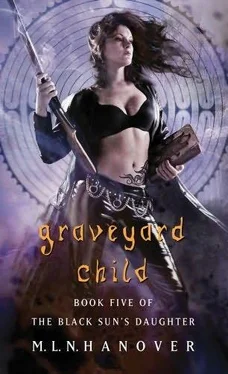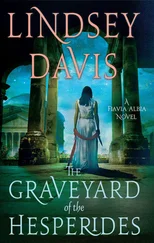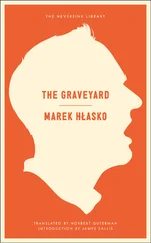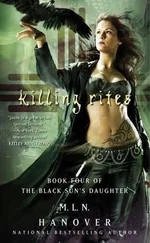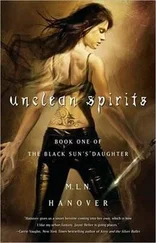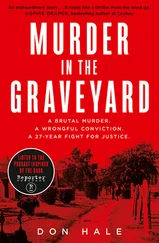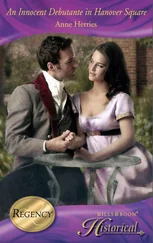Get out, I thought. Everyone get out.
I tried to center myself, tried to pull my qi together into a force I could use. I imagined the thin blue ball at my heart and I tried to push it out, expanding, but the Graveyard Child pressed in, compressing me with an invisible force that felt like nausea and despair. My breath grew shorter and shorter. The rider’s hatred and rage battered at me, but for the moment the others were forgotten. It wanted my death enough to be distracted by it. I didn’t need to live. I just needed to not die long enough for the others to get out. The gas that had fed the stove was torn at the floorboards, and a plume of flame billowed from it. I could smell my hair burning. The pain from the heat was powerful, but the Graveyard Child ignored it. Its wide mouth came close to my ear, whispering obscenities and threats. Even the veneer of humor was gone, and all that was left was raw, vicious evil.
I looked up again. Ex was pulling Curtis away. The flames were in the living room now. The Christmas tree would go up like fireworks, I thought. Another argument in favor of Hanukkah. A few candles, but no kindling. I was aware vaguely that I’d blacked out for a moment. That I was dying. Ex got Curt out. I smiled.
I win, I thought. Curt’s safe. It’s okay if I die now.
Only there was my mother, still on the floor. Still with her hands clasped to her ears, her eyes squeezed closed.
“Mother,” I called, but it hardly came out as a groan. Help me, I thought. Help me this one last time. And the Black Sun, exhausted as I was, brought its will to bear. I took a breath, the superheated air searing my lips and throat.
“Mother!” I shouted. We shouted. “ Mother! ”
And my mother moved, shifted. Her head turned and she opened her eyes, weeping, staring. The eyes of a trapped animal. She closed them again, shaking her head. Her lips were moving in prayer.
“MOTHER!” we screamed for the last time.
My mother opened her eyes once more.
They were black as the desert night. I felt a wave of cool air wash over me. The Graveyard Child, lost in its killing fury, noticed nothing, but I could breathe again. The fire was all around us, consuming the walls. I could see it spreading up the stairs toward the bedrooms. The whole house would be engulfed in minutes if it wasn’t already. But I was not burning. My mother stood, looking at the conflagration as if it were something surprising and mildly distasteful. She was clearly my own mother, the woman who had packed my lunch box in the mornings and who said my prayers with me at night, only proud now. Sure of herself and her power. When she unfurled her massive black-feathered wings, she was beautiful.
“Abraxiel,” she whispered, and it carried over the roar of the flames.
The Graveyard Child looked up, its face a mask of shock and dismay. It looked around the kitchen as if seeing it for the first time. I rolled away, my ribs bruised and aching. I smelled the bright chemical smell of the smoke. The linoleum I lay on was curling up now, the flames traveling along it. At the sink, the bottle of dish soap was melting, the soap pushing the fire around like napalm. I sat up and my clothes were on fire, the cloth of my jeans searing and falling away in black clumps. The leather in my overcoat getting hard and black as armor. I felt the cool air of the desert against my skin.
“Sonnenrad,” the Graveyard Child said.
“What have you done to my children?” our mothers asked with a single voice.
“You can’t stop me,” it said. “I’ve beaten you before. You aren’t stronger than me.”
She stepped forward and the flames retreated from her. I rose to my feet and she put her hand out, resting it on my shoulder. I had a sense of massive affection, of boundless love colored by regret and even jealousy. It was a complex and wordless emotion, and it made sense to me in a way I couldn’t fit in language. With our mother behind us, we turned to look at the Graveyard Child. It stood in the heart of the flames now, like a comic-book Satan. Its wide hands were balled in fists, and its mouth twisted with rage.
“I beat you!” it screamed. “ I beat you! ”
“There was a time you deceived me,” our mother said. “It will not happen again.”
With a shout of despair, it launched itself at her, its arms outstretched. I stepped into the attack. My body felt whole and perfect, and I plucked it out of the air and slammed it down to the kitchen floor, which was also the wind-paved stones of the desert. My desert.
A black ichor dripped from the Graveyard Child’s mouth. It struggled to its feet, slipping a little. It opened its mouth too wide for any human anatomy and shouted. The world seemed to lose its coherence for a moment. A deep and nameless dread welled up in me, but my mother’s hand on my shoulder steadied me.
“You made a mistake,” she said. “You transgressed against me. I can forgive that. But you have transgressed against the ones I love, and that I will not forgive you.”
“Oh, really? ‘Don’t cross Mama Bear’? That’s the best you’ve got?”
It leaped, again and again. I caught it and threw it to the ground and it bounced up at once, shrieking like a mad animal. Its attack was constant, vicious, and unrelenting, and I stood before it calmly, my arms and legs moving swift and sure and perfectly. In the house, something burst, a bloom of fire jetting out from under the sink. In the desert, everything was still. The two didn’t contradict, and that was what we were, all three of us.
And the moment I understood that, I saw him. Jay. My brother. His fear and his misery. The loneliness at his core and his fear of a God and a father who did not approve of him. I saw him as a boy and as a man, grown empty.
And beneath him: Eric. For a moment he was alive again. He smiled and winked. I hadn’t remembered him as being such a handsome man, but he was here before me as he had been. And more than he’d been. I saw the love in him, the joy, the certainty that he was special, and the desperation that filled him when he wasn’t. Everything he’d done—to my mother, to Aubrey and Kim, to me, to Jay—became explicable in an instant. Not forgivable. Never that. But I knew him, and I saw how he had become evil. I saw the hurt at its base, and the blight that had come from it, and then he was gone too.
For a space of time that lasted years or seconds, I saw them before me. Men and women. I saw their narcissism and felt their need, their fears and hurts and irrational angers. The pain of a lost love or a lost child or an assault that betrayed the deepest trust. None of them were healed. All of them were degraded and debased and made less than they should have been. And all dead now. Gone past redemption.
I stood witness, neither passing judgment nor offering comfort, until the last one—a woman with a round face and wide blue eyes whose name I never knew—revealed her pride and rage and faded away. Like ripping a book apart page by page until nothing was left, the Graveyard Child was gone. The desert empty except for us.
I turned to our mother then. She looked down at me with black eyes as bright as wet stone. There were two of her as there were of me. The first and greater was the Black Sun. Not the child that lived and grew with and within me, but the vast mother in the fullness of her power, vast and inhuman and terrible. But with her was my own mother, and I saw her as I had seen the others. Margaret Fournier, who’d loved her father and resented her mother. Who’d married Gary Heller because she was in love and because she was afraid not to. I saw the irrationality of her faith and the depth of her guilt, her pride in her children and her jealousy of them. I saw all that she could have been and wasn’t. And would never be. And I saw that the remnant of her—the twisted and unhealthy woman that she had become—was also beautiful in her way. Was also capable of moments of transcendence and grace.
Читать дальше
